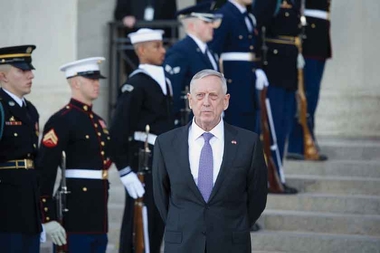Trans activists increasingly concerned about military’s transgender policy

by Rob Howard
Associate Editor
Transgender activists are becoming increasingly concerned that the Trump administration could significantly impact transgender military members, and the transgender children of military families. “They are getting ready to put us in harm’s way, putting kids at risk,” says transgender activist Allison Blaylock, who is a veteran of the Marine Corps.
She cited the withdrawal by President Trump of Obama administration guidance in May from the Justice and Education departments, spelling out the rights of transgender students in schools. Activists fear that the decision of Secretary of Defense Ash Carter and the heads of the military services allowing transgender persons to serve openly in the military might be the next reversal.
“You are talking about people and their lives, not just their careers,” says Gianna Meranto, an Oklahoma City trans activist and also an Air Force veteran. “This is something that can put people in a very bad space.”
In 2016, Secretary of Defense Ash Carter announced that the department was lifting a long-standing ban against transgender men and women serving openly in the military. The plan allowed transgender service members currently on duty to immediately serve openly. Carter gave the services until October 1 to create plans and policies, and until July 1 this year for full implementation.
The military services followed up with detailed policies, including allowing transition while in the military. As an example, the Air Force Secretary and its military Chief of Staff issued a comprehensive Policy Memorandum for In-Service Transition for Airmen Identifying as Transgender. (The use of the term Airmen applies to both genders.)
The memorandum includes transition guidelines, medical care, dress and performance requirements. It also says, “It is the Department’s position, consistent with the U.S. Attorney General’s opinion, that discrimination based on gender identity is a form of sex discrimination.”
That position appears to be based on a Justice Department press release, issued in December 2014, that reads in part, “Attorney General Holder announced today that the Department of Justice will take the position in litigation that the protection of Title VII of the Civil Rights Act of 1964 extends to claims of discrimination based on an individual’s gender identity, including transgender status.”
In addition to allowing transgender military members to serve openly, the DoD in November 2016 issued a memo regarding the treatment of transgender children of military members. Military Times reported, “All transgender youth are allowed to use restrooms and other facilities consistent with their gender identity in Defense Department programs and activities, according to a new DoD memo.”
The DoD based its decision, according to the Times, on the guidance, “from the departments of Justice and Education given to school districts in May, advising them of their obligations under law to allow transgender students to participate in activities and use restrooms, locker rooms and other facilities consistent with their gender identity.”
Attorney General Jeff Sessions now heads the Justice Department. Sessions has a long record of resisting LGBTQ rights. President Trump, who on the campaign trail sometimes seemed to support LGBTQ rights, now says those rights, and particularly transgender rights, should be up to the individual states, not to the federal government.
Given Sessions’ record, and the President’s walk-back on the rights of transgender students, activists are afraid that the next thing to fall will be the transgender service member policy of the DoD. But they are gearing up to fight.
Blaylock said, “Being a Marine has allowed me to be as strong a fighter as I am.” She has some advice for the trans community: “My biggest thing is that the trans community, if we want to be taken seriously, we have to fight on our terms and for ourselves. Too many times we want everybody else to be our cheerleaders and help us. We need to bring the fight to the battleground.
“When we let military people be who they are and be strong, they will be stronger citizens in the community.”
In late February, according to the Military Times, there had been no change in the military services’ transgender policy. But, the spokesman, “declined to say whether the Defense Department intends to review that policy in the future.”
Copyright 2017 The Gayly – April 7, 2017 @ 1:40 p.m.





